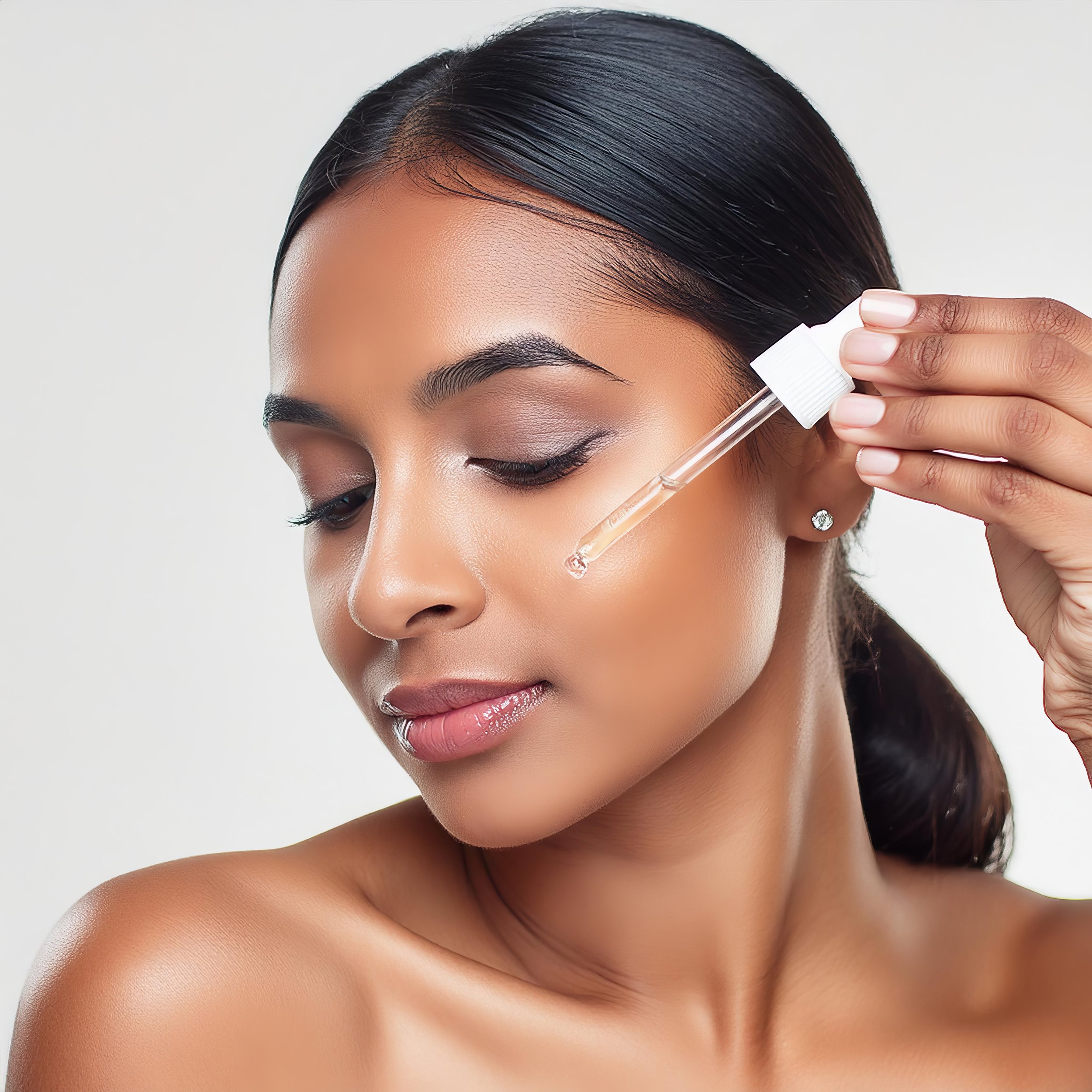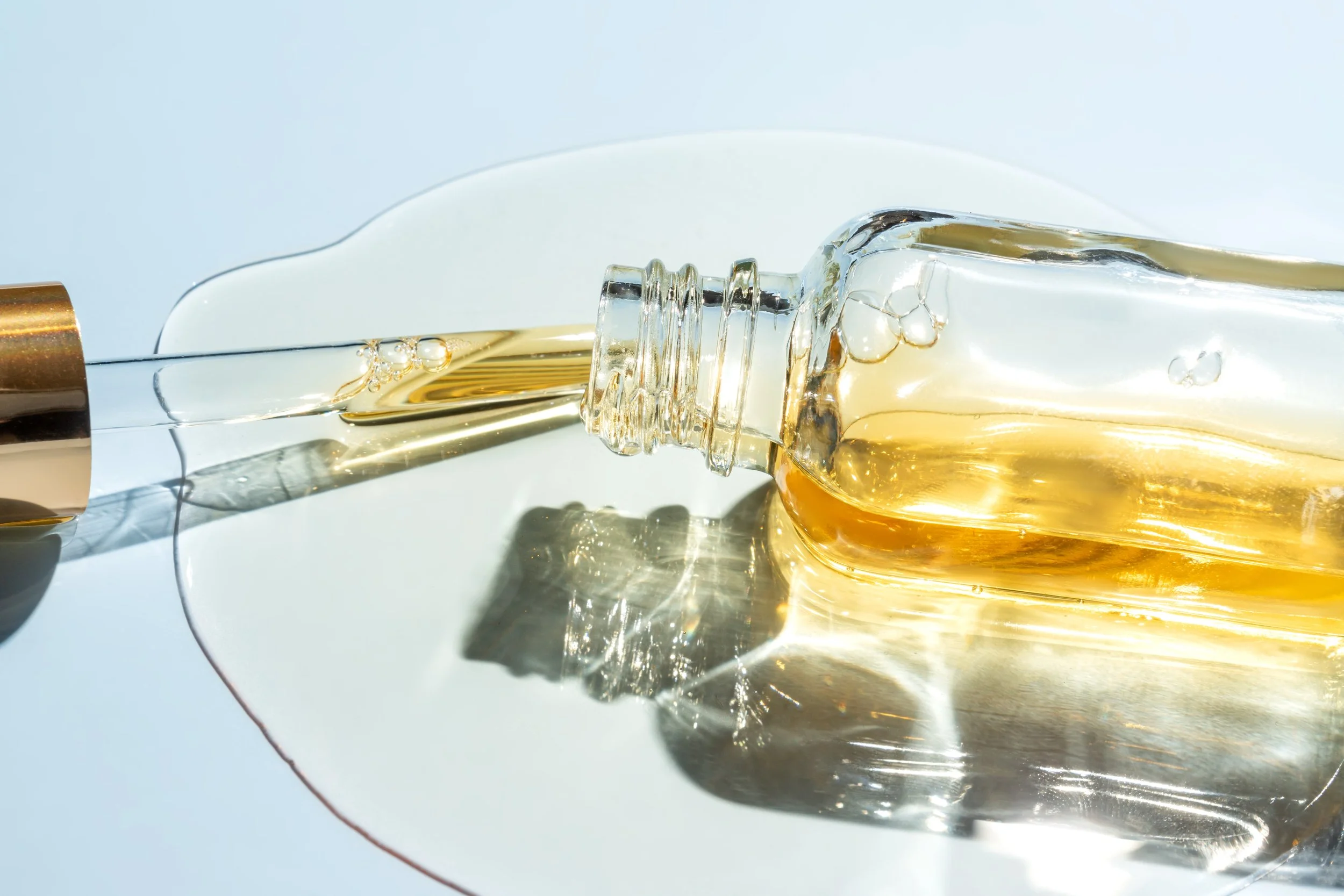The Benefits of Hyaluronic Acid in Skincare: Hydration and Anti-Aging Magic
I don't know about you but lately I have been seeing a secret ingredient pop up in seemingly every skincare product. I even started noticing it in hair products too! In the ever-evolving world of skincare, few ingredients have garnered as much attention and praise as hyaluronic acid. This unique ingredient has become a staple in many skincare routines, thanks to its remarkable ability to hydrate and combat the signs of aging. But what exactly makes hyaluronic acid so special? Let's explore the benefits of this popular ingredient and understand how it can transform your skin.
What is Hyaluronic Acid?
Hyaluronic acid (HA), also known as hyaluronan, is a naturally occurring substance found in our bodies, with high concentrations in the skin, connective tissues, and eyes. It is what's known as an glycosaminoglycan– a polysaccharide commonly produced in animals. Sounds complex but to put it simply, in the body it acts to provide tissue lubrication and hydration essential for proper cellular function. In fact, hyaluronic acid can hold up to 1,000 times its weight in water! This makes it an incredibly effective hydrating agent.
One of the newest discoveries is this compound's importance in the physical structure of the skin. It is the most common compound that lies in between cells. As we age our HA concentration decreases which can actually cause wrinkles!
Hydration Hero
One of the primary benefits of hyaluronic acid is its unparalleled ability to provide intense hydration. When added to a skincare formula, HA acts like a sponge, attracting and retaining moisture from the environment and from the product itself. When applied this helps to keep the skin plump, hydrated, and supple! Hydrated skin is essential for maintaining a healthy complexion. To ensure skin's natural barrier function we need hydration, it prevents dryness and irritation, which can be very uncomfortable!
But how exactly does hyaluronic acid work its magic? The secret lies in its molecular structure. Hyaluronic acid molecules are hygroscopic, meaning they attract and bind to water molecules. When you apply a hyaluronic acid-based product to your skin, these molecules draw moisture from the environment and lock it into the skin's surface. This not only provides an immediate boost of hydration but also helps to maintain moisture levels throughout the day.
Anti-Aging Ally
Hyaluronic acid's hydration prowess also plays a crucial role in its anti-aging benefits. As we age, our skin's natural hyaluronic acid levels decrease, leading to a loss of moisture and the appearance of fine lines and wrinkles. By replenishing the skin's hyaluronic acid levels, we can help to restore its moisture balance and reduce the visible signs of aging!
When the skin is properly hydrated, it appears smoother and more youthful. Fine lines and wrinkles become less noticeable as the skin's elasticity improves. Additionally, hyaluronic acid helps to stimulate collagen production, further enhancing the skin's firmness and reducing the depth of wrinkles. This dual action of hydrating and boosting collagen makes hyaluronic acid an essential ingredient in any anti-aging skincare regimen.
Suitable for All Skin Types
One of the most appealing aspects of hyaluronic acid is its suitability for all skin types. Whether you have dry, oily, sensitive, or combination skin, HA can provide the hydration your skin needs without causing irritation. Its lightweight, non-greasy formula makes it an excellent choice for those with acne-prone skin, as it won't clog pores or exacerbate breakouts. That's the great thing about it being a compound our bodies already produce!
Hyaluronic acid is also a great option for those with sensitive skin. Its gentle nature means it can provide hydration and anti-aging benefits without causing redness or irritation. For those with oily skin, HA can help balance oil production by providing the moisture the skin needs, reducing the overproduction of sebum that can lead to breakouts.
How to Incorporate Hyaluronic Acid into Your Skincare Routine
Integrating hyaluronic acid into your daily skincare routine is easy and can be done through various products, such as serums, moisturizers, and even sheet masks. Here are some tips to get the most out of this hydrating hero:
Cleanse: Start with a gentle cleanser to remove any impurities and prepare your skin for hydration. A clean canvas ensures that the hyaluronic acid can penetrate the skin more effectively.
Apply HA Serum: After cleansing, apply a hyaluronic acid serum to damp skin. This helps to lock in moisture and maximize its hydrating effects. Serums typically contain higher concentrations of active ingredients, making them an excellent choice for targeted hydration.
Moisturize: Follow up with a moisturizer or an oil serum to seal in the hydration and provide additional nourishment. Alternatively you can look for a moisturizer that contains hyaluronic acid as one of its key ingredients for an extra boost of hydration.
BONUS: Use a Sheet Mask: For an extra boost of hydration, incorporate a hyaluronic acid-infused sheet mask into your routine once or twice a week. Sheet masks are saturated with hydrating serums and provide an intense burst of moisture to the skin.
Don't Forget Sunscreen: Protect your skin from UV damage by applying a broad-spectrum sunscreen with at least SPF 30 every day. Sun exposure can deplete the skin's natural hyaluronic acid levels, so it's essential to protect your skin from harmful UV rays.
Additional Benefits of Hyaluronic Acid
Beyond hydration and anti-aging, hyaluronic acid offers several other benefits that make it a versatile and valuable ingredient in skincare:
Wound Healing: Hyaluronic acid has been shown to promote wound healing by regulating inflammation levels and signaling the body to build more blood vessels in the damaged area. This makes it beneficial for treating minor cuts, abrasions, and other skin injuries.
Reduces Redness: HA's hydrating properties can help to soothe and reduce redness in the skin, making it an excellent choice for those with rosacea or other inflammatory skin conditions.
Improves Skin Texture: By providing intense hydration, hyaluronic acid helps to improve the overall texture of the skin, making it feel smoother and more supple.
Boosts Skin Radiance: Hydrated skin has a natural glow, and hyaluronic acid helps to enhance the skin's radiance by keeping it plump and healthy.
Myths and Misconceptions
Despite its popularity, there are some common myths and misconceptions about hyaluronic acid that are worth addressing:
Hyaluronic Acid is an Exfoliant: Unlike alpha hydroxy acids (AHAs) and beta hydroxy acids (BHAs), hyaluronic acid is not an exfoliant. Its primary function is to hydrate and plump the skin, not to exfoliate dead skin cells.
HA Causes Breakouts: Hyaluronic acid is non-comedogenic, meaning it won't clog pores or cause breakouts. In fact, its lightweight texture makes it suitable for acne-prone skin.
Hyaluronic Acid is Only for Dry Skin: While HA is excellent for dry skin, it is also beneficial for oily, combination, and sensitive skin. Its hydrating properties help to balance oil production and improve skin texture.
Embrace the Magic
Hyaluronic acid is a true superstar in the world of skincare. Its ability to provide deep hydration, smooth out fine lines and wrinkles, and work for all skin types makes it an absolute must-have in any skincare routine. By adding hyaluronic acid to your daily regimen, you can achieve that plump, youthful, and radiant glow you've been dreaming of. Embrace the magic of hyaluronic acid and let your skin shine like never before!
Whether you're just starting your skincare journey or you're a seasoned pro, hyaluronic acid offers an easy and effective way to keep your skin healthy, hydrated, and youthful. Don't wait—dive into the transformative power of hyaluronic acid and take your skincare game to the next level!
References
Zhang, W., Mu, H., Zhang, A., Cui, G., Chen, H., Duan, J., & Wang, S. (2013). A decrease in moisture absorption-retention capacity of N-deacetylation of hyaluronic acid. Glycoconjugate journal, 30(6), 577–583. https://doi.org/10.1007/s10719-012-9457-3
Papakonstantinou, E., Roth, M., & Karakiulakis, G. (2012). Hyaluronic acid: A key molecule in skin aging. Dermato-endocrinology, 4(3), 253–258. https://doi.org/10.4161/derm.21923
Wang, F., Garza, L. A., Kang, S., & et al. (2007). In vivo stimulation of de novo collagen production caused by cross-linked hyaluronic acid dermal filler injections in photodamaged human skin. Archives of Dermatology, 143(2), 155–163. https://doi.org/10.1001/archderm.143.2.155
Frenkel J. S. (2014). The role of hyaluronan in wound healing. International wound journal, 11(2), 159–163. https://doi.org/10.1111/j.1742-481X.2012.01057.x
Lee, S. G., Yoon, M. S., Kim, D. H., Shin, J. U., & Lee, H. J. (2020). Hyaluronan Oligosaccharides Improve Rosacea-Like Phenotype through Anti-Inflammatory and Epidermal Barrier-Improving Effects. Annals of dermatology, 32(3), 189–196. https://doi.org/10.5021/ad.2020.32.3.189















Hello and welcome! I'm Eve, a Chemist turned Herbalist, sharing the wonders of plant medicine and botanical skincare. Join me on this journey to Learn, Create, and Align your Divine!